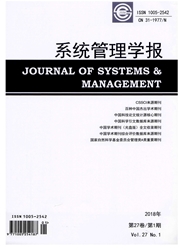

 中文摘要:
中文摘要:
从创业企业角度出发,研究风险投资公司可能出现的中途退出行为对投资可能产生的影响作用,并对其对应的激励性风险投资合约的特点进行分析。得出研究结论:混同均衡下,第1阶段风险投资公司出售股份的收益应与其在第1阶段的投资金额相等。在分离均衡下,如果第1阶段风险投资公司选择不退出,当在第1阶段投资状态不好而进行清算时,其将获得全部的清算价值;在分离均衡下,当第1阶段风险投资公司选择退出时,其在第1阶段末对所持有股份的出售总值与第1阶段投资额呈正相关关系,与清算价值呈负相关关系,而第2阶段新进入的风险投资公司的最优持股比例随第1阶段风险投资公司中途退出概率的增大而减小。分离均衡时对应的投资合约能够转变混同均衡时投资合约带来的低效率水平,前者对风险投资公司中途退出所带来的投资风险具有更大的防范作用。
 英文摘要:
英文摘要:
From the perspective of entrepreneurial companies, this paper studies the potential behavior that venture capital (VC) firms quit in halfway, which may affect the investment, and analyzes the characteristics of the corresponding incentive venture capital contracts. The results are as follows. Under t}le pooling equilibrium, the sale price of a company's shares of venture capital firms in the first phase should be equal to the investment amount in the first phase. Under the separating equilibrium, if VC in the first phase chooses not to quit, when investment state in the first phase is not good and liquidation is implemented, VC gets full liquidation value. When VC in the first phase chooses to quit, at the end of the first phase, the total cost of the sale of shares held by VC has the positive relationship with overall investment in the first stage, negatively related with the liquidation value, while new VC which enters into the second stage, whose optimal shareholding ratio is decreasing with the probability of VC's quitting in halfway in the first stage. VC contracts under the separating equilibrium can change the low efficiency level brought by VC contracts under the pooling equilibrium, the former has the greater preventing role in the risk of investment brought by venture capital firms' quitting in halfway.
 同期刊论文项目
同期刊论文项目
 同项目期刊论文
同项目期刊论文
 Research on the energy-saving and revenue sharing strategy of ESCOs under the uncertainty of the val
Research on the energy-saving and revenue sharing strategy of ESCOs under the uncertainty of the val 期刊信息
期刊信息
